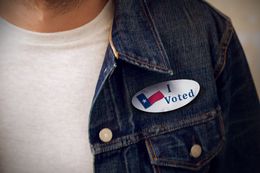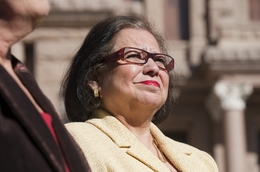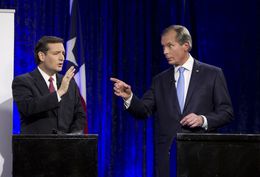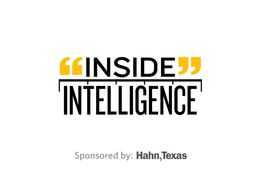In the wake of the movie theater killings in Aurora, Colorado, we asked the insiders what the legislative response — if any — ought to be.
The answers were mixed. While most don't think federal and state lawmakers should revisit existing gun laws, a slight majority said current gun laws are not restrictive enough. Asked whether lawmakers should consider changes in other policies and laws, more said No than Yes — but neither answer was appealing to more than half of the insiders.
The nuances, as usual, were in the comments offered by the respondents. Those are attached in full and, as always, we've included a sampling of those responses below.

.
Should lawmakers revisit federal and state gun laws?
• "Not given the current make up of the legislature. I'm afraid "revisiting gun laws" at the state level would mean CHLs for 9 year olds and mental patients."
• "Only those lawmakers wishing to no longer be legislators in Texas should revisit anything dealing with restricting gun regulation."
• "Little interest from either side of the aisle. The politics are baked in and only big city Mayors have running room on the issue."
• "Nuts can't kill as many people if they can't get military weapons designed to kill a lot of people."
• "Law abiding citizens should have LESS restrictions on gun ownership. The result would be an armed citizenry with the ability to protect themselves against those who wish to do harm."
• "It's time to get serious about assault rifles and high capacity magazines. No serious hunter would ever consider a 100 round mag and I'm one of those guys who hunts."
• "Since it seems like this whole episode is a case study in how to circumvent state and federal gun laws, it seems like there might be other avenues also needing to be explored at this point?"

.
Are current gun laws too restrictive or not restrictive enough?
• "On certain assault rifles and availability of armor piercing bullets."
• "Guns kill people like spoons make people fat."
• "Broad issues related to this question. Access to guns and ammo? About right, I think. Ability to protect one's self? Too restrictive. The theater was a gun-free zone. CHL holders were prevented from protecting themselves by an overly restrictive law."
• "They are just fine where they are. You didn't have that option."
• "Buying 6,000 rounds of ammo and multiple assault rifles in a 60 day span should trigger some type of reasonable intervention."
• "Just fine, I'd say"
• "Closing the gun show and Internet loophole is not too much to ask, is it? I love to hunt, but I don't need an AK-47 to bring a deer down. There is no sport in that."
• "Texas went through this back in 1999 after Columbine, and I don't think much changed afterwards in regards to being able to purchase guns."
• "It's not the guns' fault."

.
Is there something lawmakers could or should do — not involving gun laws — to help prevent assaults like this?
• "Increase funding of mental health services."
• "You can't legislate someone from being crazy."
• "Fund mental health programs. Might not have prevented this one, but there's no denying that most of these shooters are ill."
• "Better mental health services."
• "There is nothing anyone can do to stop a mad man or stupidity. The day after the crazy in Colorado killed 12 people, a stupid person with 28 people in a truck hit a tree and killed 14 people. No one is calling for vehicle regulation or stupidity regulation. The Government cannot protect us from the exceptions to the rules."
• "Purchasing guns through the Internet has become a hot topic recently. If anything changes, it may start with regulations over the ability to freely purchase weapons online without any background checks."
• "Build a culture of nonviolence, how about? For starters, legislators and partisan hacks could realize that their vicious, hateful interactions, on display in the media 24/7, create a poisonous environment perfect for incubating destructive impulses. See: "Children Learn What They Live." And then they grow up and kill people."
• "A more functional mental health system would be a good place to start"
What would be the best policy or legal response to incidents like this one?
• "Not to get global about local, individualized incidents"
• "The best policy would be to stop making policy based on anecdotes and isolated incidents."
• "Ban assault weapons"
• "No need for knee-jerk, feel-good action. This was a tragedy. No need to politicize it. Not every event should result in additional laws."
• "Acknowledge that neither government nor law enforcement can protect citizens from deranged individuals intent on inflicting injury. Encourage citizens to own a weapon, learn to use it and keep it with them."
• "Get rid of automatic weapons for starters. Track multiple gun purchase, and make sure law enforcement knows about them."
• "No changes in law are needed. In terms of industry, Movie theaters should put alarms on exit doors so ushers know if they have been propped open. Legally, everything is already in place to handle this. The system will either convict this guy of mass murder and put him away or declare him criminally insane and put him away."
• "I believe we should develop a set of characteristics associated with those who commit these type of crimes and allow educators to profile and report such candidates for counseling."
• "Society cannot prevent sociopathic behavior. It can try to recognize it and protect itself by attempts at prevention and removal of those individuals from our society."
Our thanks to this week's participants: Gene Acuna, Cathie Adams, Brandon Aghamalian, Jenny Aghamalian, Victor Alcorta, Clyde Alexander, Jay Arnold, Louis Bacarisse, Charles Bailey, Tom Banning, Dave Beckwith, Rebecca Bernhardt, Andrew Biar, Allen Blakemore, Tom Blanton, Steve Bresnen, Chris Britton, Andy Brown, Thure Cannon, Snapper Carr, Corbin Casteel, William Chapman, Elna Christopher, James Clark, Lawrence Collins, John Colyandro, Randy Cubriel, Denise Davis, Hector De Leon, June Deadrick, Nora Del Bosque, David Dunn, Jeff Eller, Gay Erwin, Jon Fisher, Tom Forbes, Norman Garza, Dominic Giarratani, Bruce Gibson, Scott Gilmore, Clint Hackney, Anthony Haley, Wayne Hamilton, Bill Hammond, John Heasley, Jim Henson, Ken Hodges, Steve Holzheauser, Shanna Igo, Deborah Ingersoll, Cal Jillson, Jason Johnson, Karen Johnson, Mark Jones, Robert Jones, Robert Kepple, Tom Kleinworth, Pete Laney, Dick Lavine, Donald Lee, Luke Legate, Ruben Longoria, Homero Lucero, Vilma Luna, Matt Mackowiak, Luke Marchant, Bryan Mayes, Dan McClung, Scott McCown, Debra Medina, Robert Miller, Bee Moorhead, Steve Murdock, Craig Murphy, Keats Norfleet, Pat Nugent, Nef Partida, Gardner Pate, Tom Phillips, Richard Pineda, Royce Poinsett, Jay Pritchard, Jay Propes, Jeff Rotkoff, Andy Sansom, Jim Sartwelle, Stan Schlueter, Bruce Scott, Steve Scurlock, Dan Shelley, Bradford Shields, Christopher Shields, Martha Smiley, Larry Soward, Dennis Speight, Tom Spilman, Jason Stanford, Keith Strama, Bob Strauser, Colin Strother, Charles Stuart, Michael Quinn Sullivan, sherry sylvester, Jay Thompson, Russ Tidwell, Trent Townsend, Trey Trainor, John Weaver, Ware Wendell, Ken Whalen, Darren Whitehurst, Michael Wilt, Seth Winick, Lee Woods, Peck Young, Angelo Zottarelli.










